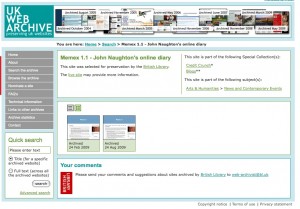Wow! The British Library has selected Memex 1.1 as one of the blogs it’s going to archive for posterity. Blush.
Laptop rage
Some academics really hate it when students spend the entire lecture updating their Facebook profiles.
Passage to… where?
Jesus College, Cambridge. Flickr version here.
Hummer RIP
Cheer up! Here’s a piece of good news for a change.
General Motors is to wind down production of its gas-guzzling Hummer brand following the collapse of a deal to sell the business to a Chinese manufacturer.
The Detroit based company, which announced plans to offload Hummer last year as part of its efforts to focus on core brands such as Chevrolet, Buick and Cadillac, said that the proposed buyers, Sichuan Tengzhong Heavy Industrial Machines, had been unable to complete the acquisition.
As a result, GM said it would begin the “orderly wind-down” of the Hummer operations.
John Smith, GM vice president of corporate planning and alliances, said the group had considered a number of possibilities for Hummer and was disappointed that the deal with Tengzhong could not be completed.
Valuing Open Source software
From Slashdot:
“The Linux kernel would cost more than one billion EUR (about 1.4 billion USD) to develop in European Union. This is the estimate made by researchers from University of Oviedo (Spain), whereby the value annually added to this product was about 100 million EUR between 2005 and 2007 and 225 million EUR in 2008. Estimated 2008 result is comparable to 4% and 12% of Microsoft’s and Google’s R&D expenses on whole company products. Cost model ‘Intermediate COCOMO81’ is used according to parametric estimations by David Wheeler. An average annual base salary for a developer of 31,040 EUR was estimated from the EUROSTAT. Previously, similar works had been done by several authors estimating Red Hat, Debian, and Fedora distributions. The cost estimation is not of itself important, but it is an important means to and end: that commons-based innovation must receive a higher level of official recognition that would set it as an alternative to decision-makers. Ideally, legal and regulatory framework must allow companies participating on commons-based R&D to generate intangible assets for their contribution to successful projects. Otherwise, expenses must have an equitable tax treatment as a donation to social welfare.”
Thanks to Glyn Moody for spotting it.
DeadHead memories
My Observer column on Sunday about the perceptiveness of the Grateful Dead has triggered fond memories in some readers — and stimulated some lovely emails, including this one from a colleague:
In 1972 I was one of the organisers of a big music festival in a place called Bickershaw near Wigan. The Dead were top of the bill and during contract negotiations with them, we were amazed that we had to provide a central area to accommodate anyone who wanted to record their gig. They had realised as early as 1972 that they could give away poor quality recordings, knowing that many would then go out and buy the real thing. I believe they were the largest earners amongst R&R bands for many years. I hung out with Jerry Gracia for a bit and he was very stoned but also very smart.
An interesting footnote – the main festival organiser was one Jeremy Beadle. He wasn’t famous yet but had already started to assume his annoying persona. I think he was the only person at the festival who wasn’t stoned, but he was also very smart and went on to make made lots of money.
There’s a web site for the aforementioned festival too. Gosh! Those were the days.
Panton Principles launched!
The principles are:
From Panton Principles.
So is the H.264 problem going to be solved?
Interesting report in The Register about Google’s acquisition of On2, the company that developed the VP3 codec which is the basis for Ogg Theora.
The question is still whether Google will turn around and open source On2’s video codecs. In announcing the original pact, Mountain View made a point of saying that it believes “high-quality video compression technology should be a part of the web platform” — and that On2 is a means of reaching that end.
The major web browser makers – including Google, Apple, Mozilla, Opera, and Microsoft – have failed to agree on a single common codec for the new HTML5 video tag. The HTML5 spec allows for any codec, and while some have opted for the open and license-free Ogg Theora, others are sticking to the license-encumbered H.264 for reasons of performance, hardware support, and alleged patent anxiety.
If you’re new to this, Charles Arthur wrote a helpful piece about it, following on a perceptive piece by Jack Schofield.
Location, location, location, and, er, burgle
Much as I am touched by my online friends’ generous desire to let me know their locations at all times, I also wonder if their generosity is entirely wise. If they are letting the world know that they are currently at some interesting location are they not also letting others know that they are not at home? This thought has also occurred to the designers of Please Rob Me, a cautionary site.
The danger is publicly telling people where you are. This is because it leaves one place you’re definitely not… home. So here we are; on one end we’re leaving lights on when we’re going on a holiday, and on the other we’re telling everybody on the internet we’re not home. It gets even worse if you have “friends” who want to colonize your house. That means they have to enter your address, to tell everyone where they are. Your address.. on the internet.
Thanks to Gerard for the link.
The Fat Lady Has Sung
Another thoughtful Op-Ed Column by Tom Friedman.
To be sure, taking over the presidency at the dawn of the lean years is no easy task. The president needs to persuade the country to invest in the future and pay for the past — past profligacy — all at the same time. We have to pay for more new schools and infrastructure than ever, while accepting more entitlement cuts than ever, when public trust in government is lower than ever.
On top of that, the Republican Party has never been more irresponsible. Having helped run the deficit to new heights during the recent Bush years, the G.O.P. is now unwilling to take any responsibility for dealing with it if it involves raising taxes. At the same time, the rise of cable TV has transformed politics in our country generally into just another spectator sport, like all-star wrestling. C-Span is just ESPN with only two teams. We watch it for entertainment, not solutions.
While it would certainly help if the president voiced a more compelling narrative, I am under no illusion that this alone would solve all his problems and ours. It comes back to us: We have to demand the truth from our politicians and be ready to accept it ourselves. We simply do not have another presidency to waste. There are no more fat years to eat through. If Obama fails, we all fail.
Yep.





